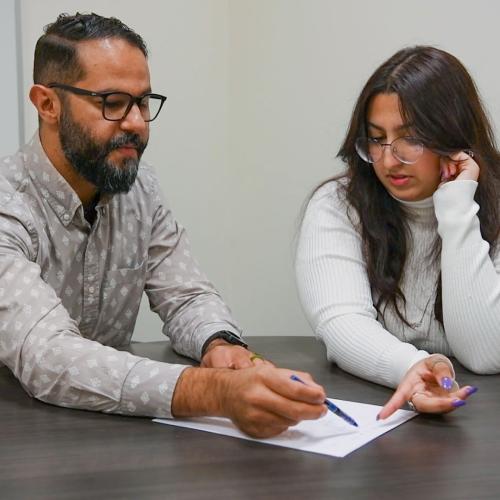The Eberly College of Science’s Learning Assistant Program provides students with an opportunity to work in the classroom and hone their communication and leadership skills in a course they have successfully completed. LAs are peers who work as a team with faculty to assist with active learning in the classroom.
Undergraduate learning assistants support their peers in the classroom
The Eberly College of Science Learning Assistant Program supports more than 8,000 undergraduates from across the University each year.
Undergraduate learning assistant Mark Puthenpurayil answers a student’s question during a chemistry lecture. The Learning Assistant Program allows students to hone leadership skills while supporting their peers within a course they previously completed. Credit: Michelle Bixby, Penn State / Penn State. Creative Commons
The Eberly College of Science’s Learning Assistant Program provides students with an opportunity to work in the classroom and hone their communication and leadership skills in a course they have successfully completed. Learning Assistants — also knowns as LAs — are peers who work as a team with faculty to assist with active learning in the classroom.
Learning Assistants receive training in evidence-based teaching practices and are focused on student learning rather than assessment. They are assigned to facilitate small group activities during lectures, recitations, or labs. They can also offer help outside the classroom, such as in review sessions and office hours, but they are not responsible for administering exams or evaluating students’ performance. Instead, they are peer leaders and learning coaches.
“It’s been an incredibly useful tool and resource for our students and our faculty members,” said Jennelle Malcos, director of the LA Program. “It gives instructors the opportunity to do more active learning and to have the freedom to choose pedagogical practices not limited by class size.”
Since its launch in 2012, the program has grown from 81 learning-assistant positions in five courses to 839 positions in more than 44 courses spanning the Eberly college’s seven departments in the 2022–23 academic year. Many courses with LAs are key “service” courses that fulfill prerequisite requirements for students in many majors across Penn State.
“Students love working with our learning assistants,” Malcos said. “Oftentimes, they see the peer as someone who is approachable and has experience to share with them — not only within the class, but also on things like careers, applying to graduate school, or getting a job.”
"I always like to remind my students that I'm also a student," said Jood Mohseni, a third-year student majoring in Environmental Systems Engineering and serving as a learning assistant in a section of the course Math 141: Calculus with Analytic Geometry II. "That way they feel more connected to me. It's nice to see that they're getting the content that I struggled with.
"Being an LA has enhanced my teamwork and communication skills," Mohseni added. "Engaging with other LAs from more advanced math classes and with the faculty who are always willing to help has made me a better student and has bettered my understanding of concepts in my math courses."
"It’s naive to think that we go to the classroom and we deliver the perfect lecture and that everybody's going to leave having a full understanding of what was covered," said Amine Benkiran, associate teaching professor of mathematics, whose courses integrate learning assistants.
"If you have a large class, it's very difficult to attend to all the questions and to reach the students who are maybe struggling in silence and have that fear of approaching a faculty member with a question," Benkiran added. "If students see a fellow that they can relate to, an undergraduate student that looks like them and has had similar experiences, they might feel a little bit more at ease then asking their questions.''
"This is my fourth semester as an LA, and what keeps me coming back is seeing how my help affects the students," said Mark Puthenpurayil, a third-year undergraduate majoring in chemistry and math and serving as a learning assistant for Chem 210: Organic Chemistry and an introductory seminar for chemistry majors. "I love to see the growth in their knowledge and see them continue in their major and even go back into the program themselves as LAs for the next set of students.
"I didn’t always want to become a professor, but after helping out my peers in the freshman dorms and then joining the Learning Assistance program, I realized just how much I really enjoyed teaching, and I decided that becoming a professor was actually the path I wanted to take," Puthenpurayil added.
